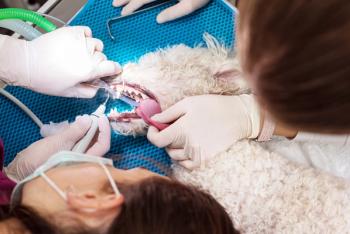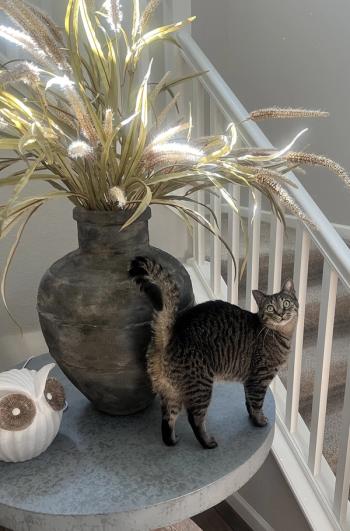
Mistakes happen: Learn how to manage them
In preparing this article, my mind races back to my days as a veterinary student at Colorado State University. One of the more vivid memories I recall involved my surgery partner. He was performing a femoral head resection. The stockinette leg slips up his arm, and he grabs it with his lower jaw and shoulder just as the surgery professor walks up.
In preparing this article, my mind races back to my days as a veterinary student at Colorado State University. One of the more vivid memories I recall involved my surgery partner. He was performing a femoral head resection. The stockinette leg slips up his arm, and he grabs it with his lower jaw and shoulder just as the surgery professor walks up.
His "oops" seemed appropriate at the time, but the professor did not display the same levity. So we got a "do over" on that surgery on the weekend . . . please Dr. Surgeon, throw us in the briar patch and make us have more surgery time. We decided we needed to say "oops" more often!
The fine line of honesty
Regardless of your skills, knowledge, and most careful intentions, mistakes will happen. Sometimes things won't work because the moon and stars aren't aligned, the client flow is atypical or training is/was inadequate (actually, the latter is most common).
Regardless of the misadventure (medical terminology for mistake), one thing is for sure: If you ever decide to blame someone or something, then you have abdicated accountability for the resolution.
With new veterinary medical doctors, the fear of failure is a major concern. The state board of veterinary medicine usually takes a dim view of any mistake that might cost life or limb, so it is a concern with a real focus on professional survival. Let's start with the easiest issues and evolve the concepts:
House rules
- Internal issues stay behind the scenes, they are never shared outside the practice.
- Any time is a good time to ask for assistance.
- Be prepared to discuss solutions to problems, not people and not just frustrations.
- If you cannot see the caring intentions of another person in the practice, then do not start the debate.
- Everyone is an emissary to and for the clients at all times; listen for their needs and exceed expectations.
Boss mistakes
This is the most variable because the boss (practice owner) can have many approaches to a new associate. If you are in a "disposable-doctor" practice, remember there is a geographic maldistribution of veterinary resources, and there is a better job elsewhere.
The other basic premise that must be remembered by new graduates is that while the boss might not always be right, he or she is never wrong.
Discuss the facts; never debate the decision. In most cases, a practice owner would prefer to show a new doctor the way rather than allow an exploration of terror; just ask for help. On the flip side, there are basic skills that a new doctor should know, and if it is converting book knowledge to actual practical skills, repetition is the only solution.
Staff mistakes
The biggest error a new doctor can make with staff is to forget they are an asset to be cherished, and that the three Rs apply all the time: respect, responsibility and recognition.
In most practices, the staff has a much better feel for the routine wellness care than a new doctor who really knows only tertiary care from the university (e.g., can do a heart transplant but has never see a cat fight abscess).
A smart practice allows a new graduate a 20- to 30-day staff-based rotation to allow the new doctor to learn the "practice ways" of doing things. Asking a staff member for guidance on "What is the practice's preferred method?" is not dangerous, but essential.
Client mistakes
Clients are an appreciating asset (à la Tom Peters, management guru), and the return visit must be planned in every encounter (à la Dr. Tom Cat, veterinary consultant).
The failure to return is the client's way of showing his or her dissatisfaction with the new doctor. Dissatisfaction is most often caused by poor communication, and for a new doctor, that often means "doctor talk did not cut it."
Poor communication starts by not listening closely to what the client is trying to explain, by thinking of a solution before all the feelings are shared and by not being sure of what is needed for the best healthcare for the animal.
Medical mistakes
The difference in treatment modality is usually not the mistake. The inability to bring a differential diagnosis into focus and settle on a definitive diagnosis is a common challenge to new graduates. Deeper diagnostic testing is appropriate for the tough cases or internal medicine situations, but seldom do you really need to run $150 of laboratory tests for FBD (flea bite dermatitis).
ECGs are important for the older animal, but a screening lead II might be all that is needed pre-anesthesia for a healthy young adult patient.
Prescription refills to save time are a mistake and will often come back to bite you like a rabid bat.
When you suspect that the medical management of a case has been going down the wrong path, get help; talk to a more-seasoned practitioner; review the Veterinary Information Network library and board discussions; or call a referral specialist.
Surgery mistakes
There is an old adage in hospitals: "Surgeons bury their mistakes, architects just get to plant vines."
The desire to "do it myself" is the most common cause of surgical mistakes; you are allowed to ask for assistance. The amount of help a new doctor gets on a surgery case, whether it be from a surgeon, a veterinary nurse or even the seasoned general practitioner, is directly related to the amount of assistance requested by the new doctor.
Mistakes cannot be erased, but they can be resutured if you ask early enough. We joke with the old veterinary quote, "See one, do one, teach one." In a short-staffed practice that is often the case, so be sure you see one before you try one.
Family mistakes
This is one area where the traditional practice owner will be of little help; most of them started out with 80-hour weeks and cannot yet accept the concept of a balanced lifestyle (that is for retirement).
Just as you need to invest some money each month in a retirement fund (e.g., 10 percent of your take-home pay) and let it compound over time, you must invest personal time in outside interests, your family or even with your significant other.
The ability to lead two lives, veterinarian and community leader, has long been an expectation in our profession, but in the new millennium, your personal life outside practice must be elevated to independent importance if you want a full career.
Making it all happen
So how do you approach a mistake and ensure it does not engulf your very being? How do you mediate the terror of the moment?
There is something called a "mistake review matrix," and it was introduced in July 2000 ISUP text titled, "Beyond The Successful Veterinary Practice: Succession Planning and Other Legal Issues." It has five simple elements of logic:
√ Here is WHAT happened! (Do not make it personal, stick to the issues that matter.)
√ Here is WHY it happened! (No blame, just "future think" alternatives.)
√ From this, I learned ______________________, and we learned ______________________.
√ Next time, I'll do _______, and we will do _____________________.
√ This went so well, we have to do it again; is there a way to improve what we did so everyone feels as good as me?
Dr. Catanzaro was the first veterinarian to earn diplomate status in the American College of Healthcare Executives. In the past four years he has had 10 practice management-related texts published. Questions can be directed to Veterinary Practice Consultants (Catanzaro & Associates, Inc.), 18301 West Colfax Ave., Bldg. R101 Golden, CO 80401; (303) 277-9800; Fax (303) 277-9888; email:
Newsletter
From exam room tips to practice management insights, get trusted veterinary news delivered straight to your inbox—subscribe to dvm360.




